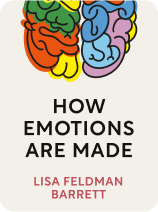

This article is an excerpt from the Shortform book guide to "How Emotions Are Made" by Lisa Feldman Barrett. Shortform has the world's best summaries and analyses of books you should be reading.
Like this article? Sign up for a free trial here.
What are the benefits of letting go of your anger? How can letting go of anger protect your body from illness?
In her book, How Emotions Are Made, neuroscientist and psychologist Lisa Feldman Barrett studied how humans create and experience emotions. Based on Barrett’s findings, letting go of your anger might be the healthiest thing you can do—physically and mentally.
Read on to learn why Barrett says letting go of your anger protects you from illness.
Letting Go of Your Anger As an Antidote to Illness
In addition to techniques such as increasing your emotional granularity, letting go of your anger and resentment has been shown to improve your physical and mental health. Indeed, various religious and philosophical traditions have long preached the benefits of practicing forgiveness.
But what exactly is forgiveness, and, given how hard it can be to achieve, does it really have any tangible value? Research conducted by the Stanford Forgiveness Projects demonstrates that, after being taught a specific method for forgiveness, 27% of subjects experienced fewer physical complaints, such as pain, gastrointestinal upset, and dizziness. 70% reported a decrease in their feelings of hurt, and 13% experienced reduced anger.
Use Forgiveness to Let Go of Your Anger
According to Frederic Luskin, the Director of the Stanford Forgiveness Projects, forgiveness and letting go of your anger doesn’t have to mean reconciling with the person who hurt you or condoning their actions. Forgiveness is for you, not for the person who hurt you. As the saying goes, “Holding onto anger is like drinking poison and expecting the other person to die.”
Forgiveness isn’t letting someone get away with hurting you; it’s attempting to achieve some peace around what happened, in part by employing calming practices to soothe your body’s stress response and let go of your anger. This dovetails with Barrett’s research that an overactive stress response leads to inflammation, which in turn can cause illness and disease.

———End of Preview———
Like what you just read? Read the rest of the world's best book summary and analysis of Lisa Feldman Barrett's "How Emotions Are Made" at Shortform.
Here's what you'll find in our full How Emotions Are Made summary:
- A deep dive into what emotions really are and where they come from
- How some cultures have different emotions than others
- The difference between feelings and emotions






